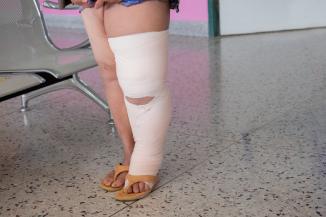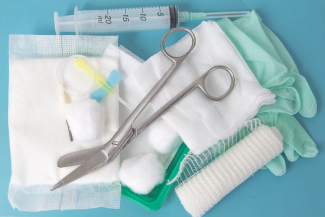Must Love Dogs: Animal Adventures in Home Health Care
January 10, 2019
"Must Love Dogs (Cats, Lizards, Snakes, Birds, AND Arachnids)." This is a line that needs to be next to all job advertisements for home health care staff. You see, I am a dog lover, not because I love dogs but because I have a way of being able to adapt in order to survive. I work in home care as a clinical nurse specialist and have slowly learned to love dogs ever since I was reported to my manager for mentioning I didn't like them much. Shortly after this I was told not to visit a patient whose cat I had shooed away from my wound dressing field. While discussing this with a colleague, she told me of the bird that had landed on her head that morning just as she was probing the patient's foot wound with a Q-tip. Maybe everybody has had experiences like mine, but maybe not, so I would like to put mine to paper to entertain you in this season of good cheer.
The first is of my own pet and a visit not from a nurse but a police officer. He was a strong, tall man and went to sit on the chair where my iguana was hanging out. She was quite big, about five feet long, though of course three-fourths of that is tail; still, she was a big lizard, so I warned him before he went to sit. I am glad I did, because he not only took a different seat but kept glancing over to her, checking she was not going to move toward him. He soon settled, though, and stopped checking; this meant that when the cat ran into the room, he thought it was the iguana on the move and literally jumped out of his chair. It was an amazing sight and quite unforgettable.
Pets and Wound Care
My own encounters are mainly with dogs and cats. After being in home care just a few weeks, I went to see a patient with arterial ulcers on his feet. As there was a significant amount of flaking skin I had considerately put newspaper on the floor and was trying to keep the dog away from it, just thinking all the bits would go everywhere. While in the process of cleaning the foot and around the base of the necrotic fifth toe, the dry, black pinky fell to the floor and I suddenly saw the muzzle of the dog nip it off the paper and… It is hard to describe how I felt. I retched while the owner and his partner laughed. I am quite squeamish, and to this day the memory nauseates me.
It was not long after this gruesome incident that I got bitten. I was in the house of a hospice patient, and they had a Collie who appeared friendly and calm. I was getting ready to leave and moved toward the door; suddenly the dog went crazy (apparently, she doesn't like door handles). As I turned the handle of the door, she leapt at my hand, missed it as I pulled it away, and decided instead to bite the closest part of me, the top of my leg. She drew blood, gave me a nasty bruise, and ruined my pants, which the owner kindly paid for.
We should balance this out with a couple of cat stories. I had not noticed the cat curled up on the bed of the client as I prepared to do wound care for a large dehisced abdominal wound. I had removed the wound dressing and extensive packing, changed my gloves, and watched in horror as the cat awoke and started to bound across the bed. I put out my hand out and caught the cat by the belly directly over the wound. I honestly think there would have been paws in the wound. The patient's son said, "Good catch." I changed my gloves and continued with the dressing. The cat must've stirred up the dust in the process because as I lifted out the inch-wide Nu-Gauze from the bottle, a large piece of fluff drifted onto my left hand. I grasped it with my left thumb and packed the wound with my right hand, cutting off and discarding the end piece with fluff attached.
One summer, when I had no coat to drape over my bag to deter felines, I turned to find the cutest little kitten investigating my blood pressure cuff in my bag. If it had been the end of the visit, I could have done an efficient cat kidnapping, but it was not to be.
Being expected to perform our jobs as wound care providers while there are three crazy excited dogs being told to calm down, come and get a treat, and behave is just not reasonable. Being greeted by a massive lunging, slurping creature as we struggle with our bags and computer to get into a patient's home is not pleasant. On one occasion, the dog jumped up at me causing me to lose my balance. I tried to catch the table to save myself and knocked over a bottle of digoxin, which split and opened on the floor. The patient shouted at me, telling me to pick them up quickly, screaming "the dog might eat them." Oh, dear.
Killing the pet is definitely a bad way to go, and oddly enough I have managed to do even that. I was pulling out a set of scales from under a bed, and as I stood and looked down, the largest indoor spider I have ever seen in Vermont came trotting toward me. I am quite phobic, and moved here from the UK to avoid such arachnids that seem to focus on those who fear them. Being that I had my professional hat on, I did not scream or make any fuss (how cool is that, way beyond what I would've expected). I just squashed it into the wood floor with some adrenaline strength that caused an extenuated grinding motion of my foot. The elderly woman put her hands to her face in horror, "OH NO, not Boris, you've killed Boris." Once she was over the shock, she explained she had come to form a friendship with Boris. S/he came out from under the bed about the same time every day and would rush over to the other side of the room and creep along the baseboard. The patient forgave me, so in this fatal case I was not reported but forgiven my reaction.
How Can We Deal With the Problem?
I have worked for several home care agencies, and one of them tried to solve the pet issue by encouraging the nurses to remind patients that their pets are meant to be in another room. It worked out that I was the only nurse making the request. I discovered this when I thanked the patient for having the dogs (one killer Rottweiler and an ankle-nipping Jack Russell) in the other room. She said, "Oh, I don't mind putting them up for you, but I do mind that you don't like them." I then made the mistake of trying to explain that it wasn't that I didn't like them, but that it is difficult to work with them around—bad idea. Despite severe difficulties with her ostomy, she would not let me visit again!
So, what is the answer? People don't just have pets; they really are part of the family. My personal approach now with my patients' pets is to always greet a dog with affection and tell it I love it and it is my favorite. I won't ask the patient to put the dog away, and I tolerate all behavior. This may not be easy, but I am adaptable and not frightened or phobic of dogs. Carrying treats may help, but honestly the best answer is to ensure all home health care staff MUST LOVE DOGS.
About the Author
Margaret Heale has a clinical consulting service, Heale Wound Care in Southeastern Vermont and draws on her extensive experience as a wound, ostomy and continence nurse in acute and long-term care settings to provide education and holistic care in her practice.
The views and opinions expressed in this blog are solely those of the author, and do not represent the views of WoundSource, HMP Global, its affiliates, or subsidiary companies.












Follow WoundSource
Tweets by WoundSource